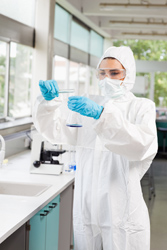Role models for women in science
The 'Ambassadors for women and science - Use of best practice instruments to strengthen women in research' (Pallas Athene) project worked to stimulate the participation of women in science and technology (S&T). The EU-funded Specific Support Action's objectives were based on addressing various factors identified as contributing to the underrepresentation of women in higher positions in science organisations. These include a lack of role models, an almost exclusively male-dominated working culture and inefficient integration of the gender dimension in European research. Such an initiative is of paramount importance given that grant applications no longer require the submission of gender action plans. Pallas Athene partners brought together 20 high-level scientists from six Helmholtz Association centres. These excellent women researchers, termed ambassadors, employed a range of best practice instruments when contributing their time as role models towards the goal of empowering women in science. One of these instruments, carried out by the Deutsches Krebsforschungszentrum (DKFZ), was Science Goes Public (SGP). Through this tool, ambassadors presented the public with their research findings in efforts to arouse interest for science, especially for young people. SGP was carried out in association with schools, universities and teacher training institutions. The SGP tool was adopted and utilised a number of times by another two centres as well. Other institutes carried out the measures of 'physik.begreifen' (DESY), 'kidsbits' (IPP) and 'Women in science - science for women' (GSF), which were especially designed for the purposes of the Pallas Athene project. Through sub-projects such as SGP and 'Grasp Physics', ambassadors and teacher students were instrumental in implementing higher education didactics and enhancing science policy development for student curriculums. The project was deemed successful overall, with higher numbers of women scientists being recorded in the six centres of the Helmholtz-Association following the project end. Efforts did not stop there, however, as discussions and exchanges of experiences regarding gender equality and measures for strengthening female S&T representation are ongoing and are still actively promoted.



